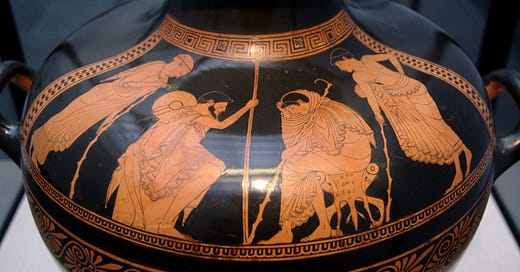Back in Book One of the Iliad, Agamemnon acted like a jerk, and Achilles, who doesn’t have a diplomatic bone in his body, made it worse and worse, until his prize, a captive woman named Brisêis, was turned into a bone of contention between the two men. It became a matter of honor for Agamemnon to insist, specifically, that only Achilles’s prize woman would do, and equally a matter of honor for Achilles to refuse. In fact, the only thing that changed Achilles’s mind was the direct intervention of the goddess Athena. See my article, The Prize and Honor
Then in Book Two, there’s a comedic interlude, where Thersitês, a very uncouth soldier, who had hoped to avoid the battle, berates Agamemnon for making Achilles so angry he’s refused to fight. Thersitês is bowlegged, limps, has rounded shoulders, a cone-shaped skull, and his hair is a mangy, mold-like fuzz. And he’s known for mouthing off at officers, none of whom like him.
He repeats all of Achilles’s complaints, in much cruder terms. Agamemnon gets all the bronze, all the gold ransom for the Trojan captives that the rank and file soldier, like he himself, did the work to nab. And the girls? Why Agamemnon gets the hottest girls to have sex with – fresh ones, that he gets to keep to himself, all private-like, and meanwhile, poor sods like Thersitês have to go shed their blood on the battlefield. What’s that about? The rest of them should leave Agamemnon on the beach to lay his slave girls and take ship for home.
And yes, at least the way Robert Fitzgerald translates, the difference in the language is that marked, compared to how he translates the way the others talk. It seemed like comic relief, seeming to imply, by putting it so crudely, that Achilles was going overboard in his complaints to Agamemnon.
But now, in Book Nine, Achilles makes himself look like that caricature of Agamemnon.

Agamemnon has been well and thoroughly humbled. The gods and goddesses, with their usual interference, are giving the Trojans the upper hand for now. He needs to get Achilles back in the battle. And so he pulls out all the stops. Gold, seven beautiful women won in battle, and of course, Brisêis returned to Achilles, just to start out with. Once they defeat Troy, Achilles will get the first pick of the spoils, including women, of course. Once they’re back home, he’ll have his choice of which of Agamemnon’s three daughters to marry, without needing to pay a bride-price. In fact, she’ll even come with a dowry of seven regions of Agamemnon’s kingdom.
And Agamemnon swears he hasn’t had sex with Brisêis. Which I admit, seems a bit of an ask to believe. On the other hand, since Homer is so direct on who is and isn’t sleeping with whom, and doesn’t specifically call it out, maybe we, and Achilles, are supposed to believe that. Especially when he goes on to describe Achilles’s reaction to the offer.
Achilles starts by claiming to love Brisêis, using the term based on philos, not eros. Although she was won in battle, he says she was like a wife to him, and don’t all men love and care for their wives? Apparently not Achilles. He’s not only just fine with not getting Brisêis back. Homer makes sure we know that he and Patrocles are each bedding down that night with one of the several captive women they’ve already won in battle.
The contrast between how dishonored Achilles has just claimed, once more, to be, and the wealth he demonstrates in hosting the delegation sent to propose Agamemnon’s terms, is jarring. He has women, maids, gold, bronze, iron; all won there in battle. Homer seems to be making clear that Achilles was, in fact, greatly honored. And his sticking point is a girl he claims to love, but who does not distract him in any way from any of the other beautiful women (plural) he has at his disposal. And for whom he certainly doesn’t consider it worth giving up staying to win the glory that he has been promised by the gods for staying and fighting.
So is that Homer’s point in Book 9? That Achilles is an example of hubris?




If you're robbed by someone in authority, and you have the upper hand, you stick it to them for all you can, IMHO.
Agamemnon was in a position of trust and thoroughly blew it. Thersites pointed this out extremely well, IMHO. He was a simple spear carrier, expected to be killed while the "heroes" do all the killing and very little of the dying.
Unless the Greek deities get involved. I picture those "worthies" treating the war as a sporting event, with pennants, ball caps, and box seats, feeling nothing for the suffering and sacrifice that always comes with a war.
The side bets must have been running constantly.
"Fifty silvers that Ajax dies in the next battle."
"Done."
"When is Paris 'at bat'?"
"Oh, he's sitting the bench for nearly getting his @$$ handed to him by Menelaus."
And poor, suffering Thersites is the one rational guy, seeing his leaders for the buffoons they are and suffering for his honesty. 🤷♂️